信息科技英语综合教程 刘爱军(完整版)
- 格式:docx
- 大小:2.29 MB
- 文档页数:8
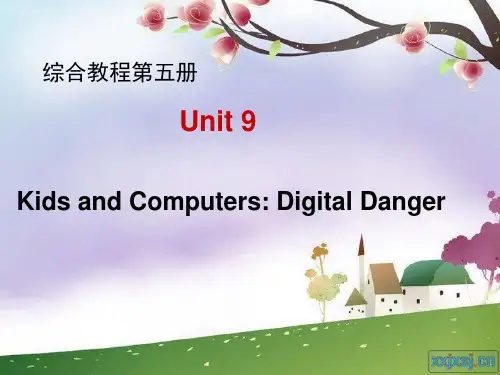
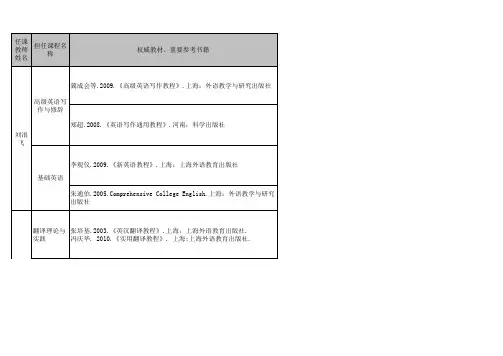
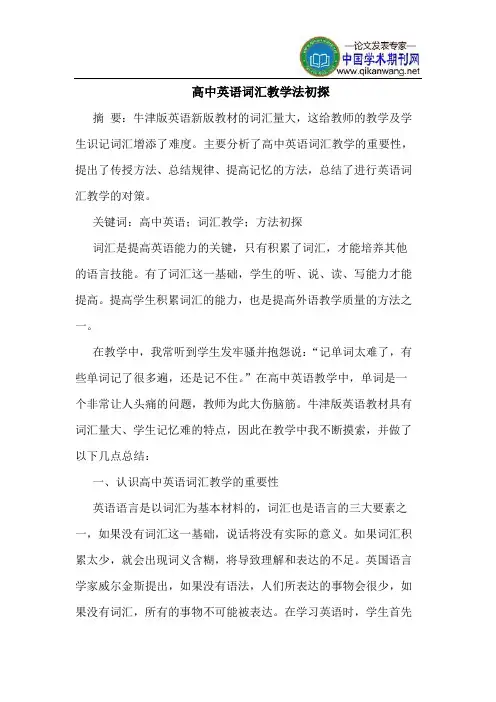
高中英语词汇教学法初探摘要:牛津版英语新版教材的词汇量大,这给教师的教学及学生识记词汇增添了难度。
主要分析了高中英语词汇教学的重要性,提出了传授方法、总结规律、提高记忆的方法,总结了进行英语词汇教学的对策。
关键词:高中英语;词汇教学;方法初探词汇是提高英语能力的关键,只有积累了词汇,才能培养其他的语言技能。
有了词汇这一基础,学生的听、说、读、写能力才能提高。
提高学生积累词汇的能力,也是提高外语教学质量的方法之一。
在教学中,我常听到学生发牢骚并抱怨说:“记单词太难了,有些单词记了很多遍,还是记不住。
”在高中英语教学中,单词是一个非常让人头痛的问题,教师为此大伤脑筋。
牛津版英语教材具有词汇量大、学生记忆难的特点,因此在教学中我不断摸索,并做了以下几点总结:一、认识高中英语词汇教学的重要性英语语言是以词汇为基本材料的,词汇也是语言的三大要素之一,如果没有词汇这一基础,说话将没有实际的意义。
如果词汇积累太少,就会出现词义含糊,将导致理解和表达的不足。
英国语言学家威尔金斯提出,如果没有语法,人们所表达的事物会很少,如果没有词汇,所有的事物不可能被表达。
在学习英语时,学生首先要掌握词汇,词汇的积累对学生各种语言技能的发展有着最直接的影响,假若没有词汇的积累,学生对语言就不能运用自如。
所以,词汇教学在英语教学中发挥着重要的作用。
在目前的高中英语教学中,教师对词汇教学的时间投入过多,达到的效率及效果较差,在词汇量的积累要求不断提高的今天,传统的讲单词的方法已经不适用了,引导学生读单词和背单词的词汇教学模式也得到了更新,《普通高中英语课程标准》也提出了更高的目标和要求。
二、传授方法,总结规律,提高记忆大部分学生在记忆英语单词时主要采用了零星的或者片段的记忆方法。
学生对新学的单词没做任何分析与比较,遇到较生的单词只会死记硬背。
这种被动的记忆单词的方法很难在头脑中留下清晰的、可追忆的印象,过一段时间以后,这些单词就很容易被遗忘。



信息管理与信息系统专业英语教案2017年2月目录Unit 1 Management Information System (1)Unit 2 Information Systems and Organizations (12)Unit 3 Database Management Systems (23)Unit 4 Management Information Systems Development (36)Unit 5 Systems’Success and Failure (49)Unit 6 Application of Information Systems (60)Unit 7 Decision Support Systems (76)Unit 8 Information Security (88)Unit 9 Internet Economy (102)Unit 10 Knowledge Management (103)Unit 11 Data Mining (120)Unit 12 Data Warehouse and OLAP (137)Unit 1 Management Information System一、正文翻译什么是管理信息系统?什么是MIS?学会如何应用信息技术解决问题的第一步是给管理信息系统这个术语进行广泛地描述。
也许,你在使用计算机和各种软件上有一些经验,然而计算机仅仅是管理信息系统的一部分。
管理信息系统(MIS)或计算机信息系统(CIS)包含了与计算机有关的五个方面:硬件、软件、人、程序和数据群。
信息技术(IT)这一概念代表是不同种类的硬件和在信息系统里所使用的软件,包括计算机和网络设备。
MIS的目标就是通过提供有质量的信息使管理者做出更好的决定。
用于计算机信息处理的有形设备称为硬件。
控制硬件的一套指令就是我们所说的软件。
在计算机发展的初期,与MIS直接有关的人通常是指程序员,设计分析员和几个外部使用者。
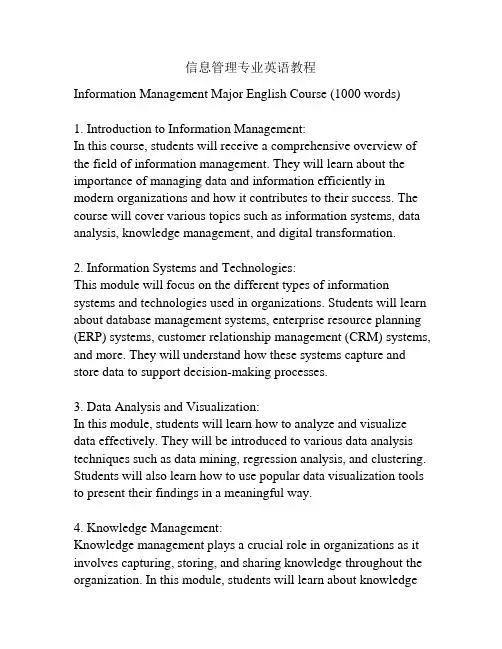
信息管理专业英语教程Information Management Major English Course (1000 words)1. Introduction to Information Management:In this course, students will receive a comprehensive overview of the field of information management. They will learn about the importance of managing data and information efficiently in modern organizations and how it contributes to their success. The course will cover various topics such as information systems, data analysis, knowledge management, and digital transformation.2. Information Systems and Technologies:This module will focus on the different types of information systems and technologies used in organizations. Students will learn about database management systems, enterprise resource planning (ERP) systems, customer relationship management (CRM) systems, and more. They will understand how these systems capture and store data to support decision-making processes.3. Data Analysis and Visualization:In this module, students will learn how to analyze and visualize data effectively. They will be introduced to various data analysis techniques such as data mining, regression analysis, and clustering. Students will also learn how to use popular data visualization tools to present their findings in a meaningful way.4. Knowledge Management:Knowledge management plays a crucial role in organizations as it involves capturing, storing, and sharing knowledge throughout the organization. In this module, students will learn about knowledgemanagement systems and strategies. They will understand how to develop a knowledge sharing culture and use technologies to facilitate knowledge sharing.5. Digital Transformation:In the digital age, organizations need to adapt to technological advancements to stay competitive. This module will focus on digital transformation and its impact on organizations. Students will learn about emerging technologies such as artificial intelligence (AI), blockchain, and the Internet of Things (IoT). They will explore how these technologies can be leveraged to enhance business processes and decision-making.6. Managing Information Security:Information security is a critical aspect of managing data and information. In this module, students will learn about the different types of security threats and vulnerabilities that organizations face. They will understand the importance of implementing security measures and best practices to protect sensitive information. Students will also learn about legal and ethical considerations in information management.7. Project Management:Effective project management is essential for successful implementation of information management initiatives. In this module, students will learn about project management methodologies and tools. They will understand how to plan, execute, and monitor information management projects within the given scope, time, and budget constraints.8. Future Trends in Information Management:This final module will explore the future trends and challenges in information management. Students will discuss topics such as big data, cloud computing, cybersecurity, and the role of artificial intelligence in information management. They will reflect on the skills and knowledge they have acquired throughout the course and consider how they can apply them in their future careers.In conclusion, this Information Management Major English Course provides students with a comprehensive understanding of the field. By covering topics such as information systems, data analysis, knowledge management, digital transformation, information security, project management, and future trends, students will develop the necessary skills and knowledge to thrive in this rapidly evolving industry.。

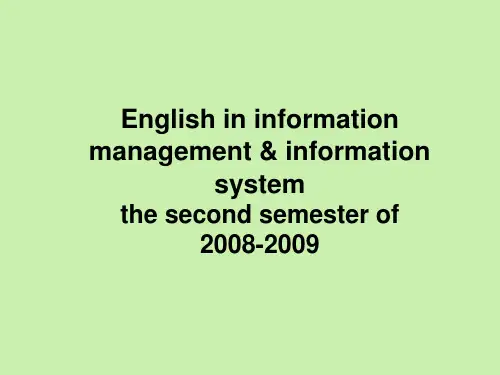
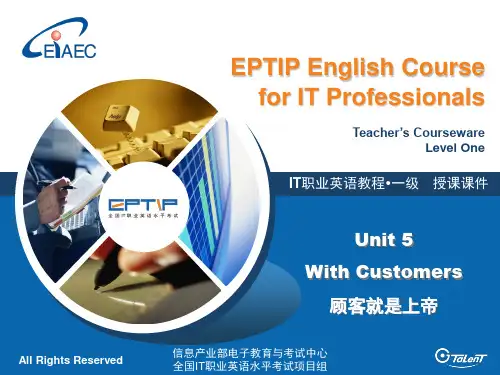
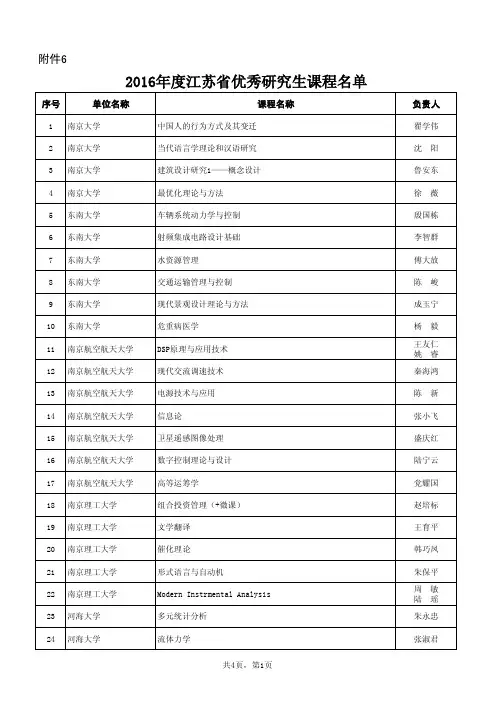
科技英语(电子类)(第三版)lesson1Unit1AThe section serves to introduce the subject of communications systems.本节的目的在于介绍通讯系统这一课题In its basic electrical sense,the term communications refers to the sending,reception and processing of information by electrical means.从其基本的电学意义上讲,通信是指通过电子手段发送、接收和处理信息。
Radio communication was made possible by the invention of the triode.三极管的发明使得无线电通信成为了可能It has subsequently become even more widespread and refined through the invention and use of the transistor,integrated circuit and other semiconductor devices.随后通过晶体管、集成电路和其他半导体器件的发明和使用,它变得更加广泛和精制,A modern communications system is first concerned with the collation,processing and storage of information before its transmission.现代通讯系统第一步要考虑的是在发送消息前对它进行整理、处理和储存The actual transmission then follows.然后进行实际的传输Finally we have reception.最后我们进行接收In order to become familiar with such a system,it is necessaryfirst to know about amplifiers and oscillators.为了熟悉这样一个系统,有必要先了解放大器和振荡器From time to time it is also well to consider some human factors as they influence a particular system.时不时也应该考虑一些人为因素,因为他们会影响某一特定的系统。